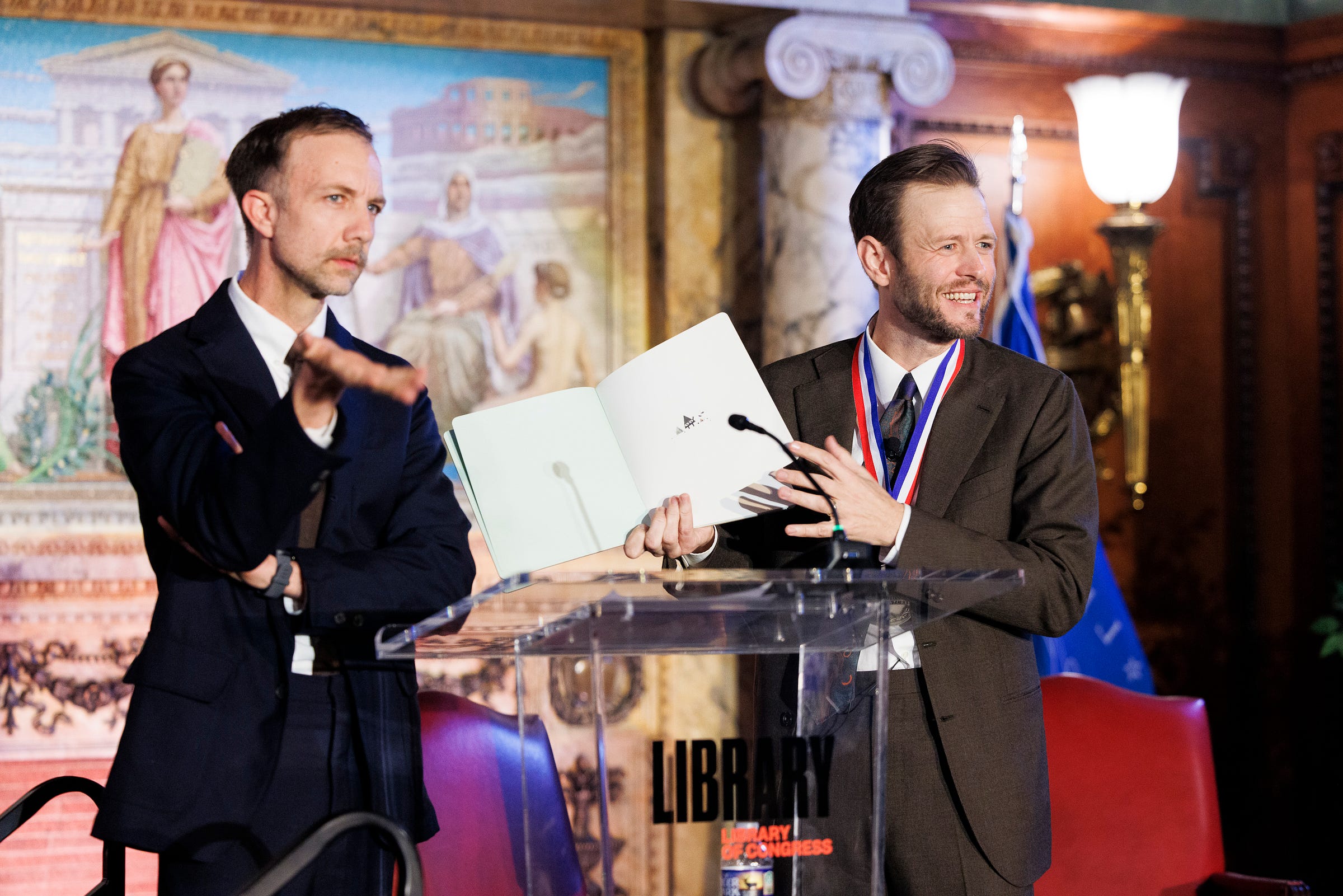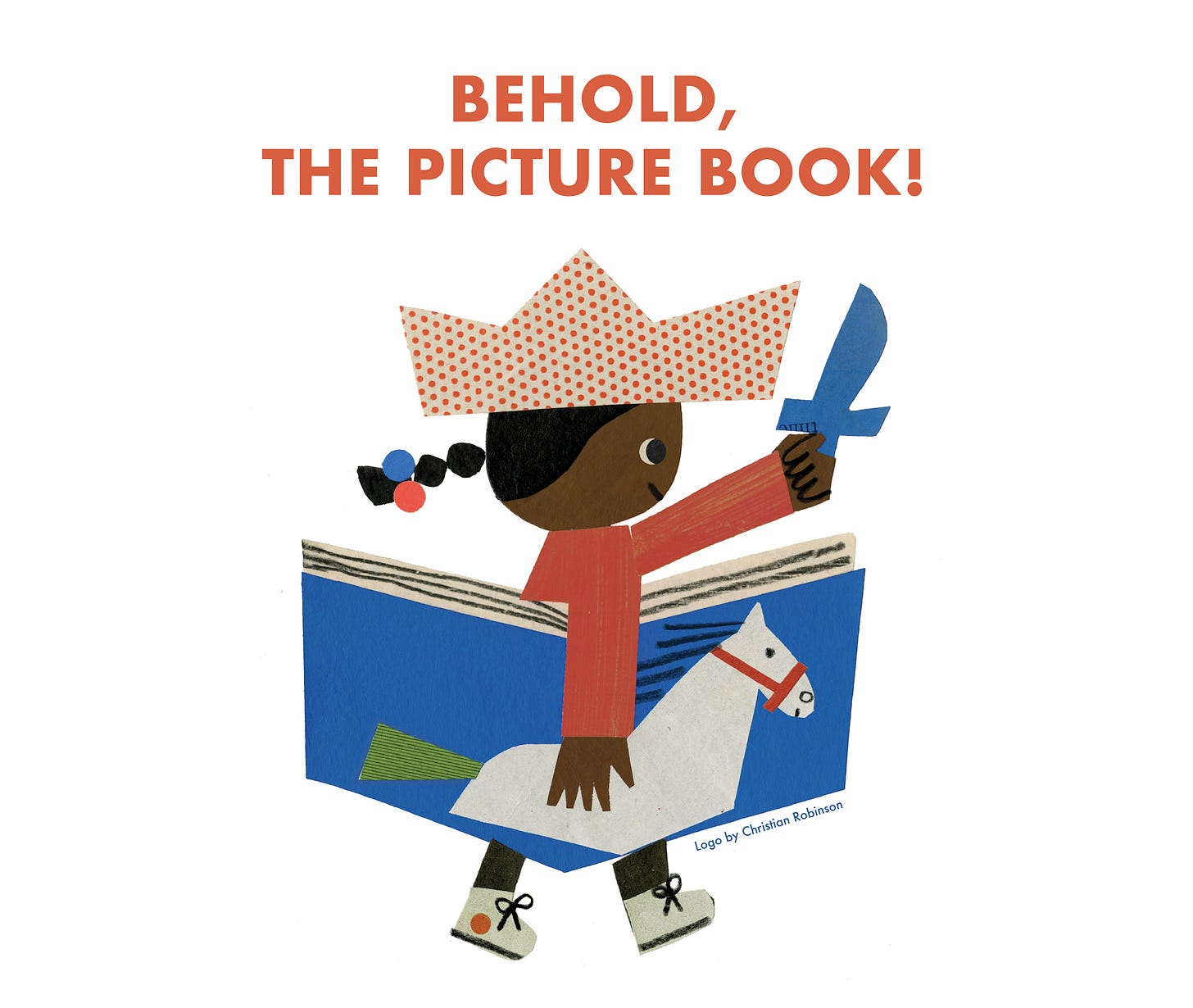Jon Gets to Interview the New Ambassador for Young People's Literature
(It's Mac.)
Last week was a big one for the editorial staff of this newsletter. Our very own Mac Barnett was officially appointed to a two year term as the National Ambassador for Young People’s Literature by the Library of Congress. The roster of past ambassadors is a list of truly great writers for children, and I dare say Mac fits very nicely on it. I spoke to Mac via text, on what I assume is still a secure line, about his thoughts on the appointment and what the position entails. —JON
(Also: Every Child a Reader and the Library of Congress are currently accepting proposals from schools and school libraries, public libraries, bookstores, and other community organizations across the United States interested in hosting an Official Ambassadorial Event.)
JON: Hi Mac.
(Can I still call you Mac?)
MAC: (No.)
JON: Greetings, Your Excellency.
MAC: Hi Jon.
JON: So. A big week around here, for you. For us. For me, in a way too, since I do feel, in some ways, many ways, more important than I did before. You were appointed to be The National Ambassador for Young People's Literature by the Library of Congress. This happened for real, we were just in Washington, D.C. last week, and it happened.
MAC: Yeah, we were there together!
MAC: There was an inauguration ceremony at the Library of Congress, in a beautiful and rather grand room, and I really was overcome with a sense of occasion and gravity. But also, the library has the good sense to invite kids to the ceremony — which by no means diminishes the feeling that this is consequential. In fact, for me, it enhances it. But it did remind me that I was there for something I knew how to do, which is to tell stories to kids.
I didn't get a chance to tell you this that day, Jon.
(It was a very busy morning, and then the restaurant we went to that night was noisy.)
But: I was feeling a little awestruck standing up there, and it wasn't until I called you up to the podium to read Triangle with me that I got comfortable. So thanks for doing that. And apologies to the Library of Congress for not telling them that I was going to do that.
(The Triangle reading is at about the 28:00 minute mark if you want to watch.)
JON: You did ask me ahead of time, via text, if I'd do it, and I remember initially typing in a reply that was like, "I would be honored," not sarcastically, but that's truly how I felt. And then I thought, "We text 20 times a day about, like, pants, I gotta go more casual," so I changed it to, "For sure!" But I really did feel honored, and it did feel very special at the time, doing it. But that is what's so great about this position for you — they are not asking you to do something especially difficult for you, or something that seems like new or mysterious ground. They have appointed you for this because you are truly very, very right for the job. Can you tell us what, in your view, the job... is?
MAC: Yeah. The heart of the job, I think, is to champion children's literature, or maybe "young people's literature," depending on how you feel about calling teens "children."
Teens, generally, probably, don't love it.
JON: That's childish of them.
MAC: But I've been thinking a lot about this term "Ambassador."
(In the U.K., this position is called the "Children's Laureate.")
And the previous people who've held the post (I am the ninth Ambassador) have all interpreted the word in different ways.
Jason Reynolds, for instance, encouraged kids to tell their stories and become their own ambassadors.
Jon Scieszka put little flags on the front of his car and tried to get the DMV to give him diplomatic plates.
JON: (I think he'd tried that before he even got to be ambassador.)
JON: Yeah, I don't know if this is a question with a clear answer, but I think about it with this newsletter, and it seems to have some overlap here too. Do you think of this as kind of a defensive position about the validity of it? Or is the state of mind more affirmative than that? Like, do you begin to talk about it in circles where it wouldn't ordinarily come up with like, "I know, I know - this is for kids, but..." or do you just go in with the attitude of like, "This stuff is valid and important and I'm going to talk about it that way"?
MAC: Oh man, I think about this a lot.
Jon, I don't know if you know this about me, but sometimes I am fueled by fiery indignation and righteous anger.
JON: NO.
MAC: But in this position, I want my main tone to be celebratory.
(But ready to tussle.)
JON: Does the position strike you as one with any clear goals, or do you kind of set those goals yourself, or is that the wrong way to look at an appointment like this?
MAC: No, they ask every ambassador to come up with a platform, a specific focus for the term.
Ready for mine?
(Pretend like you don't already know what it is.)
JON: (OK.)
MAC: The title is Behold, the Picture Book! and that logo is by Christian Robinson.
JON: I really, really like it. You guys both killed it.
MAC: So yeah, I get to spend two years celebrating young people's literature in all its many forms, but especially picture books.
JON: Was there a moment when you didn't think you'd focus on picture books, especially? You've certainly been active in most of the other areas of young people's literature, you can speak to them very effectively.
(Not that I'm complaining, I couldn't talk to you as much about those other ones.)
MAC: When I first proposed Behold, the Picture Book! to the folks from the Library of Congress and Every Child a Reader (the Library's partner on this thing), I was worried the team would feel that the focus was too narrow, but I was relieved when everyone got excited.
I do think that we rush kids out of picture books, and that they appeal to a much wider swath of readers than we think.
You and I always get excited when middle- and high-school teachers come to our signings and talk about using picture books in the classroom.
You and I also always get bummed out when a parent tells us their five-year-old has grown out of picture books and now reads real books like Harry Potter, which may seem like a weird thing to say to us at a signing, but people say a lot of weird things to us at signings.
JON: It's always an interesting kind of progression to talk to older kids about it. At first you can tell they are sort of bemused and they think it's funny to be talking about those books, but then, like we talked about, if we're serious in our tone about them, they follow us there, and soon we're having really interesting conversations without any of the hedging of like, "Well, this is just for little kids." The underlying message is: "This is a craft like any other," but we don't shout that at the top.
MAC: I think you just got to the two reasons picture books are underestimated.
The first reason is that people don't understand how picture books work. The picture book is a unique and peculiar art form. Understandably, there isn't widespread knowledge of picture book mechanics.
(SUBSCRIBE TO LOOKING AT PICTURE BOOKS.)
JON: (😬😬😬)
Right. Which is why you are choosing to focus on bringing these books, and the talk about them, into rooms that are not necessarily where children hang out. Cause the children are good. They are fine with themselves and with these books.
MAC: Yeah, I find that kids are the only other people who think about these books as deeply and carefully as us people who make them.
Picture books are thriving because our readers are so adventurous and funny and keen and open-minded.
So yeah, it's exciting: It feels like there's this thing I know to be true but which most people don't (yet!) believe — that picture books are a great literature that deserves to stand alongside the novel, the short story, poetry, plays, etc. etc.
JON: It feels like the impulse, understandably, when you're asked to come up with a platform for a position like this, might be to aim it outward, to something about ourselves, general or specific, that you feel needs working on. But you've chosen here to flip the focus around, to point it at the form instead of on us. Do you find yourself making the case that this will hopefully, or even probably, have some kind of social impact?
MAC: I think a deeper respect for kids' books requires a deeper respect for kids.
JON: Gotta admit, I was prepared for a longer answer there, but, again and again, I am being shown, anew, why they chose you, Your Excellency.
MAC: Thanks, Jon.
JON: Mac, we're all so damn proud and happy that you're there. It's going to be extremely exciting to watch what you do. Congrats, pal. They are lucky to have you. <3
MAC: Aw, well, I mean: I couldn't have done it without you.








"I think a deeper respect for kids' books requires a deeper respect for kids."
Yes.
Congratulations Mac! This is so well deserved.
Can we hope for an English translation of La Porta Segreta, which would fit nicely with your new duties? 🤞🏻🤞🏻🤞🏻